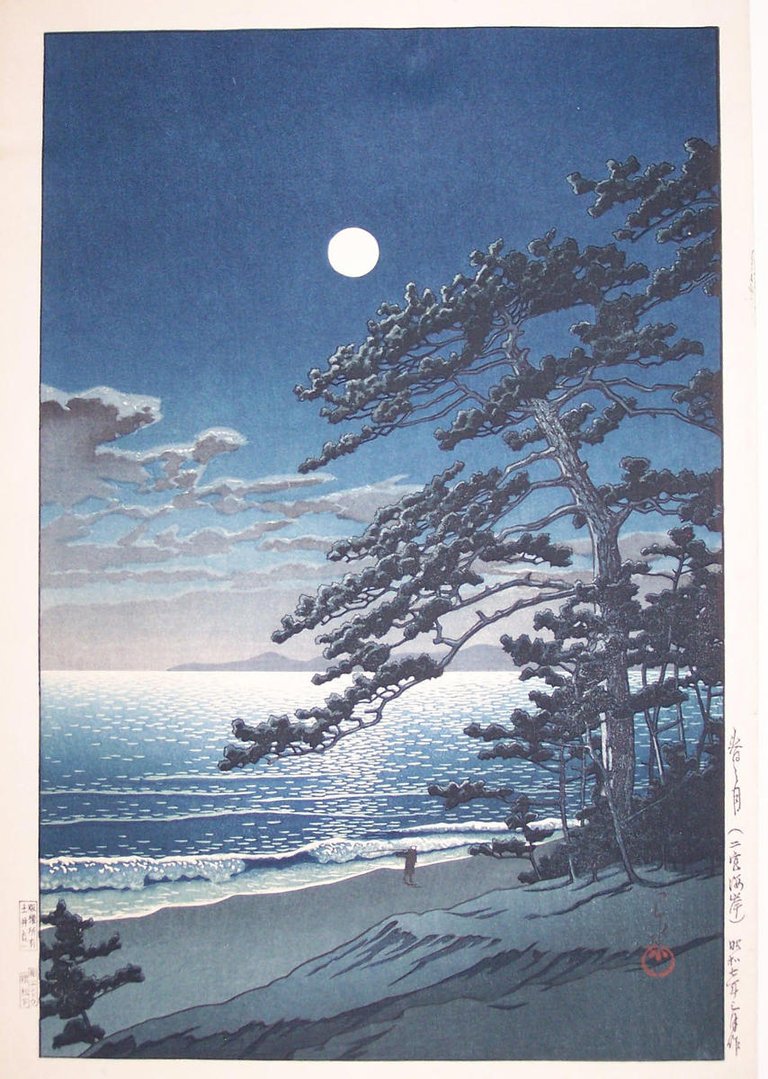It may be winter or close to it, but sometimes we see blossoms around this time, strangely enough.
haru no yo no yume mite saku ya kaeribana
dreaming of spring nights?
the returning blossoms
—Chiyo-ni


Sometimes we get a short warm spell during the early winter of a few days or a week and this can cause flowering trees, like cherry blossoms, to become confused and partially bloom. In haiku, we call these winter bloomings kaeribana, "returning blossoms". The unexpected appearance of these beautiful flowers in the otherwise harsh winter landscape can bring a little bit of joy as well as make us think longingly of the spring, still a few months away. kaeribana is a kigo (season word) for early winter.
In her musing about how the returning blossoms might see things, Chiyo-ni is making a pretty clear allusion to Heike Monogatari, an epic tale from the 13th century that tells the true story of the rise and fall of the Heike—the Taira clan.
The story opens with the following poem:
The ring of the bells at Gion temple
echoes the impermanence of all things.
The color of the sala flowers
reveals the truth that to flourish is to fall.
The proud do not endure long
like a passing dream on a spring night.
The mighty fall at last,
like dust in the wind
The poem sums up the story, telling us that as soon as one gains power, the end of that power is already present, that the duration of that power is as a dream on a spring night. This echos the Buddhist idea of impermanence (無常, mujō), a very common idea in Japanese literature and culture.
This would not have been lost on her audience who would have been very familiar with classical Japanese literature. In making this allusion, Chiyo-ni is suggesting that even the small act of flowers blooming out of season mirrors the impermanence and unpredictability of life, adding a sense of wistfulness and reflection to the haiku. Applying these ideas to the returning blossoms, which we are both happy to see, but sad at the idea that their fleeting beauty will soon be gone, we get a strong feeling of mono no aware, "the pathos of things".
Born in 1703 in Kaga Province as the daughter of a picture framer, Chiyo-ni showed an early talent for poetry. She studied haikai under Kagami Shikō, a leading disciple of Bashō, and later Rōgenbō. Renowned for her graceful and contemplative verses, she became one of the most celebrated haikai poets of her era. At age 52, she took Buddhist vows, deepening the spiritual resonance of her work while continuing to write until her death in 1775.
❦
 |
David LaSpina is an American photographer and translator lost in Japan, trying to capture the beauty of this country one photo at a time and searching for the perfect haiku. He blogs here and at laspina.org. Write him on Twitter or Mastodon. |
That is, me! If you like this translation, feel free to use it. Just credit me. Also link here if you can. ↩
That's interesting that your warm spells get hit enough to do that. I'm guessing it probably happens more often down south from where I live. Today was brutal. 13 with a wind-chill close to zero.
Wow, that's cold! Stay warm!
Early-winter by the traditional Japanese view is still autumn by the Western view, so it's more of that mixture of cold days and "indian summer" days. After we get into winter proper, there isn't much warm weather. Though at least where I am, it doesn't get down as cold as where you are!
Ah, okay, that makes sense. yes, our indian summer days are well behind us now! We did have a couple of those, usually they happen after a few cold days and they turn the boilers on for the winter. Then you come into work and it's hotter than hell in the building!
The intricacy of the life cycle !BBH !LOLZ
lolztoken.com
I wonder how the next chapter in my life will go.
Credit: reddit
$LOLZ on behalf of day1001
(5/8)
NEW: Join LOLZ's Daily Earn and Burn Contest and win $LOLZ@dbooster, I sent you an
@day1001 likes your content! so I just sent 1 BBH(4/20)@dbooster! to your account on behalf of @day1001.
(html comment removed: )
)
Without the context of the winter warm spells, the entire meaning of this poem would be lost to someone who is not familiar with it. Great discussion that shows the depths of a few simple verses.